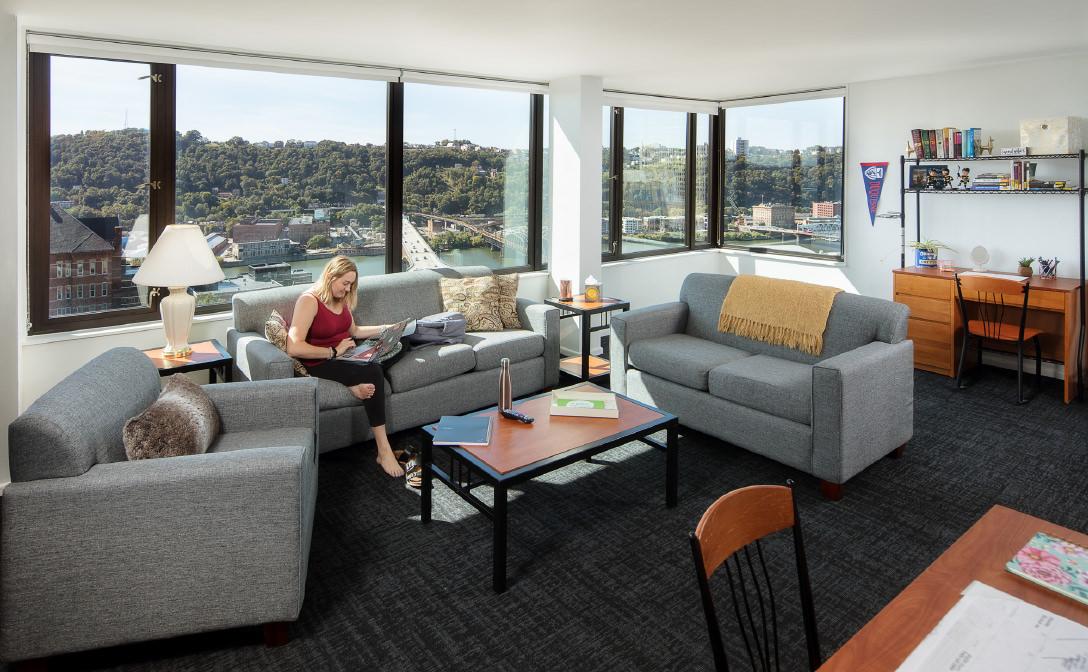Share:
Move-in hype fades fast. What keeps students on campus—and coming back to the same space night after night—is a study lounge that works. Here are five field-tested design strategies you can roll out quickly (with fast, low-cost options) to turn “meh” rooms into magnets for focus and collaboration.
1) Zone the room (and say it out loud)
Why it works: Clear zones reduce friction. Students instantly know where to whisper, where to whiteboard, and where to hop on Zoom.
Do it now
- Split the room into Focus | Collaborate | Call/Zoom using rugs, plants, and furniture orientation (not just signs).
- Add micro-signage at eye level: “Quiet Zone,” “Team Space,” “Zoom Booths.”
- Park mobile whiteboards between zones to act as acoustic + visual buffers.
Budget tiers
- No-cost: Reposition furniture; add printed zone signs.
- Low: Two rugs + two mobile whiteboards.
- Invest: Two acoustic phone pods or curtained nooks on casters.
2) Power + Wi-Fi before pretty
Why it works: If students can’t plug in or stay connected, they won’t stay.
Do it now
- Ensure one outlet per seat (use UL-listed power hubs under tables).
- Stock cables for USB-C/USB-A at a supervised “Tech Bar.”
- Place a Wi-Fi QR and network name at each table; test speed in-room.
Budget tiers
- No-cost: Relocate seating to where outlets already are; post the Wi-Fi QR.
- Low: Power strips with cable management; clip-on task lights.
- Invest: Furniture with integrated power + fast charging.
3) Light for stamina, treat sound like a design material
Why it works: Good light fights eye strain; quiet rooms feel safe and productive.
Do it now
- Aim for layered lighting: overhead (ambient) + task lamps at tables.
- Kill glare; swap harsh bulbs for warm-neutral (around 3500–4000K).
- Add soft surfaces: acoustic panels, curtains, plants, and carpet tiles.
- A small sound machine/white-noise unit near the entry can mask corridor noise.
Budget tiers
- No-cost: Re-aim fixtures; close blinds in late afternoon; add plants.
- Low: Plug-in task lamps; peel-and-stick acoustic tiles.
- Invest: Dimmable LED fixtures with zones + ceiling baffles.
4) Mix heights, movement, and comfort (not just couches)
Why it works: Different brains, different bodies. Variety increases dwell time.
Do it now
- Provide three heights: lounge chairs, standard tables, and counter-height rails facing a wall for solo deep work.
- Put tables on casters so groups can reconfigure in seconds.
- Keep sightlines open for safety; maintain ADA clearances.
Budget tiers
- No-cost: Re-shuffle to create one counter-height “rail” using existing pieces.
- Low: Order 2–3 flip-top tables on casters + lightweight stacking chairs.
- Invest: Ergonomic task chairs + sit/stand tables.
5) Make belonging visible—and program the first 30 days
Why it works: Students return to spaces where they feel seen and supported.
Do it now
- Install a community board for peer tutoring hours, RA study nights, and club sessions.
- Rotate student artwork; add a small snack/hydration station with refill map.
- Launch a “First-30” calendar: quiet study cafés, calculator clinics, resume drop-ins.
- Add a QR to reserve a study table or pod for 60–90 minutes.
Budget tiers
- No-cost: Print a 30-day calendar and promote it in residence group chats.
- Low: Clip-on display rails for rotating art; tabletop water dispenser.
- Invest: Simple booking software + lockable charging lockers.
Measure what matters (so it keeps getting better)
- Occupancy & dwell: quick hourly headcount for two weeks.
- Noise & complaints: track drops after acoustic tweaks.
- Power use: “unplugged seat” requests should go to near zero.
- Satisfaction pulse: 3 questions via QR (“Lighting,” “Noise,” “Would you return?”).
Need a second set of eyes?
If you want a fast, data-driven plan for a specific hall, our Fresh Eyes Consulting team can complete a three-day on-site assessment and deliver phased, budget-sensitive recommendations aligned to recruitment and retention goals. (Ask about pairing it with the Student Housing Calculator for demand modeling.)
Have a favorite lounge transformation? Send a before/after—we love a good glow-up.
